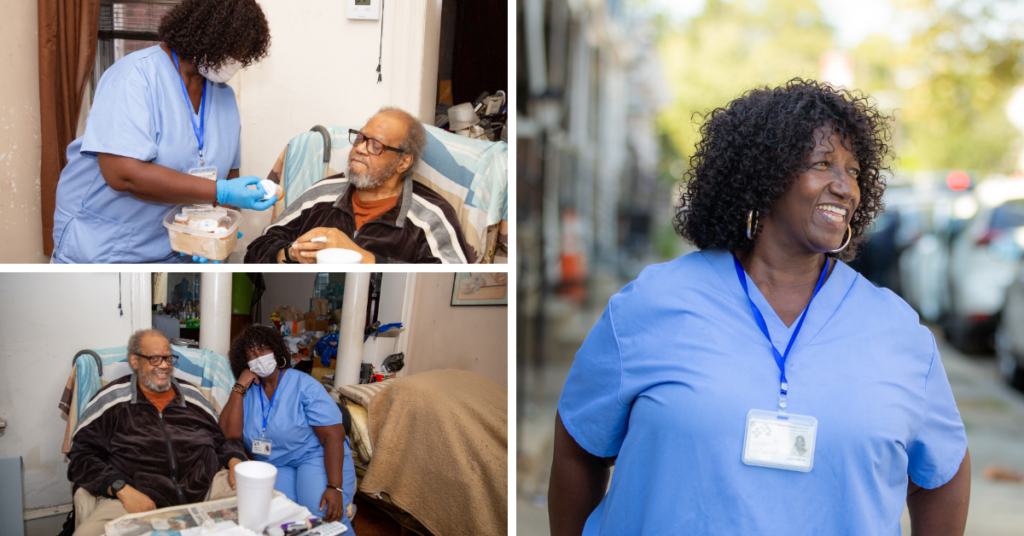
Through interviews and original photography, PHI is working with direct care workers nationwide to document their stories and share their ideas for transforming jobs in long-term care. This interview is with Yvette Beatty, a Home Health Aide and Board Member at Home Care Associates in Philadelphia, PA. She has been a direct care worker for 27 years.
On why she decided to become a direct care worker

“It means a whole lot for me to reach out my hand or give my time to help people. It’s always felt like my calling.”
“It means a whole lot for me to reach out my hand or give my time to help people. It’s always felt like my calling. When I was a little girl, I used to help out a couple in my neighborhood who were both legally blind. I would run to the store for them, help them carry bags, or help them back home. They wanted their independence, and that was special to me.
When I was around 20, I volunteered for a hospital, and then I had different jobs caring for people in their homes and getting paid under the table. I went to school and got hired to work with children with disabilities, and I did that for five years until I had a baby. I needed to make money, but I struggled. I had to go back on welfare, but I knew I didn’t want this to be my life, my children’s lives.
A neighbor told me about Home Care Associates (HCA). I walked in one day and they accepted me. Me, a single mom on welfare. They didn’t shut the door on me. They gave me training. They gave me a voice. I became a home health aide and have stuck with HCA ever since.”
On what she would change about home care
“Home health aides deserve better pay. Our job titles might not be the same [as other healthcare workers], but we’re all on the same team. We are the start of the line for care, along with family members. It’s the home health aides that keep clients out of the hospitals or nursing homes. But we get forgotten. You do this job from the heart, not for the money. But still, we are very underpaid.
Some of us are living paycheck to paycheck. I’ve been working through this coronavirus, even at the peak. When I see a box of masks, I’m buying it, even though that $5 could make a difference in feeding my family or paying my bills. But we do what we got to do.”
“Home health aides deserve better pay. Our job titles might not be the same [as other healthcare workers], but we’re all on the same team.”
“A neighbor told me about Home Care Associates (HCA). I walked in one day and they accepted me. Me, a single mom on welfare. They didn’t shut the door on me. They gave me training. They gave me a voice.”
On employer supports that matter the most to her
“HCA is like my second family. They gave me options that I thought I would never have as a single Black woman. When they first trained me to be a home health aide, and I was nervous about the tests, they built up my confidence and had tutoring if I needed help. At times when I was struggling, they loaned me money. They taught me about managing my finances and helped me find daycare. Every [opportunity] they threw at me, I took it. And the next thing I know, the sky is the limit. I serve on the board of directors, different committees, and the policy action group.
“Being part of a worker-owner company is beautiful. Being a worker-owner means that I have a voice and can share my opinion.”
Being part of a worker-owner company is beautiful. Being a worker-owner means that I have a voice and can share my opinion. HCA shows me why the company makes certain decisions. I own a house now, and I’m not on welfare. My daughter went to college and I’m a grandmom. I’m getting ready to retire, and I’m just proud of my success in my life, and I’m so glad that HCA was part of it.”
Photography: Kristen Blush @kristenblush
***
The Direct Care Worker Story Project aims to enhance the visibility of this workforce, amplify its voices, and draw on workers’ unique wisdom to inform policy and practice. The Project seeks to address the lack of representation of direct care workers in public narratives and ensure images used to depict long-term care work are grounded in workers’ and clients’ real experiences. If you’re interested in sharing your story as a direct care worker, please email us at info@PHInational.org.





